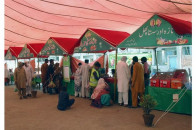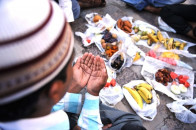Freedom of belief: ‘Religious, ethnic discrimination brews intolerance’
Speakers insist on reviewing policies, providing basic rights.

Speakers insist on reviewing policies, providing basic rights. PHOTO: FILE
Speakers at the launch of “Making the un-equals, equal: Parliamentarians’ initiative for minorities” report contended that the discrimination between religious and ethnic minorities will only contribute to intolerance.
Canadian High Commissioner Heather Cruden said the discrimination causes unnecessary social division and suffering and contributes to an environment of fear, intolerance and stigmatisation. “In extreme cases, we have seen countries being torn apart due to these destructive tendencies. However, countries where these practices have ended are more peaceful, safer and secure”, she said.
She further said that freedom of religion and belief including the freedom to practice one’s beliefs is a universal human right, which is explicitly highlighted in the Article 18 of the Universal Declaration of Human Rights.
Cruden also spoke about Canada’s new policies and mentioned how the implementation of these rights is not an overnight process and can take time, but the implementation needs to begin at some point.
Dr Aasiya Nasir, an MNA from the Jamiat Ulema-e-Islam (Fazl) said that freedom of religion or belief is a fundamental right and is being violated in Pakistan and across the world. This, she insisted, could have devastating consequences.
“This situation must be challenged and reversed. Extremism and terrorism is not confined to a country, it is spreading like wild fire and the time has come when we stand up for what is right and address the issue,” she added.

She also highlighted that one of the biggest problems is forced conversation and our religion does not allow that. “We should stand against it as it is a national agenda and it affects every citizen of the nation. If we don’t raise our voice today, it will be too late”.
Taking the discussion forward, the Senate’s deputy speaker from JUI-F Maulana Abdul Ghafoor Haideri said it is important to understand at an international level that all religions teach peace and tolerance.
“The tendency to link Islam with intolerance and extremism is the root cause of all misunderstandings between different religions. Fundamentalists that belong to any religion are extremists and are not representatives of their religion and any generalisation to that effect should not take place,” he said.
He further said there is a dire need to respect every being’s right to freedom of difference of opinion. “We must also acknowledge the importance of legislation to promote pluralism and safeguarding the rights of marginalised communities in Pakistan and across the world. It is our responsibility to not allow any religious, ethnic or gender difference in doing so. The 1973 Constitution of Pakistan protects all citizens equally and Jinnah’s vision also ensures that Pakistan becomes a land of equal opportunities for all minorities,” he added.
The seminar ended with a performance by classical dancer Indu Mitha and her students.
Published in The Express Tribune, November 25th, 2015.



















COMMENTS
Comments are moderated and generally will be posted if they are on-topic and not abusive.
For more information, please see our Comments FAQ